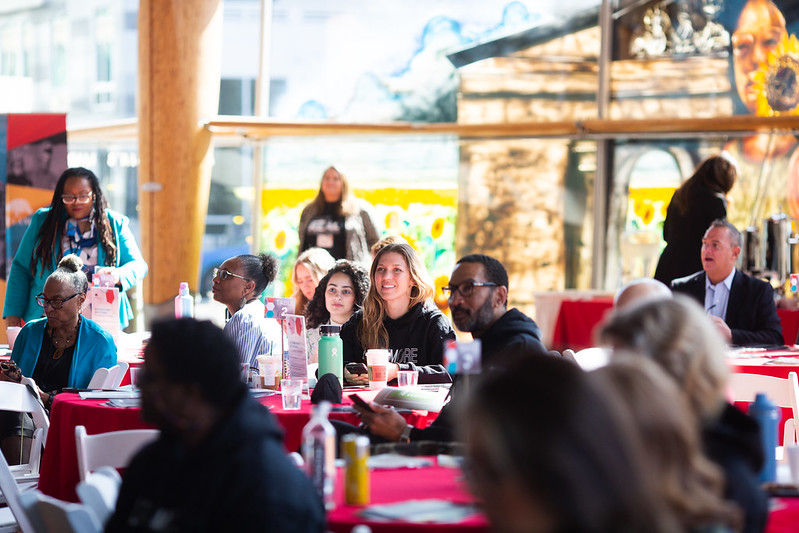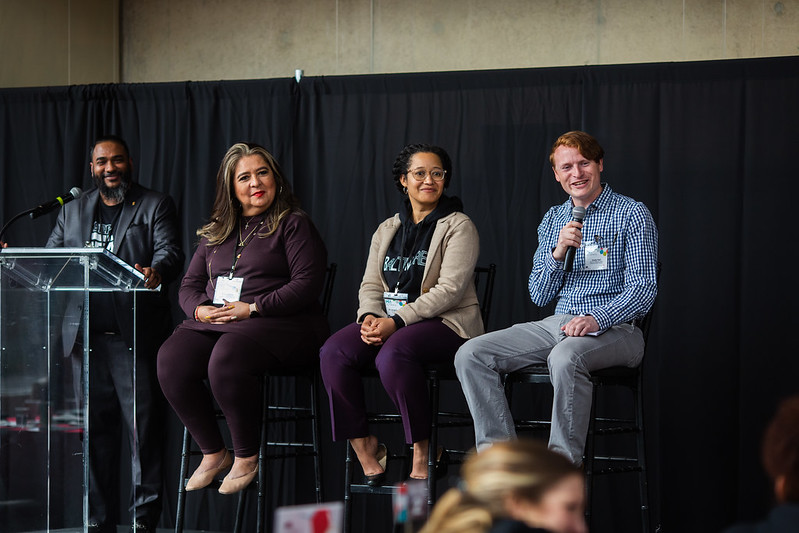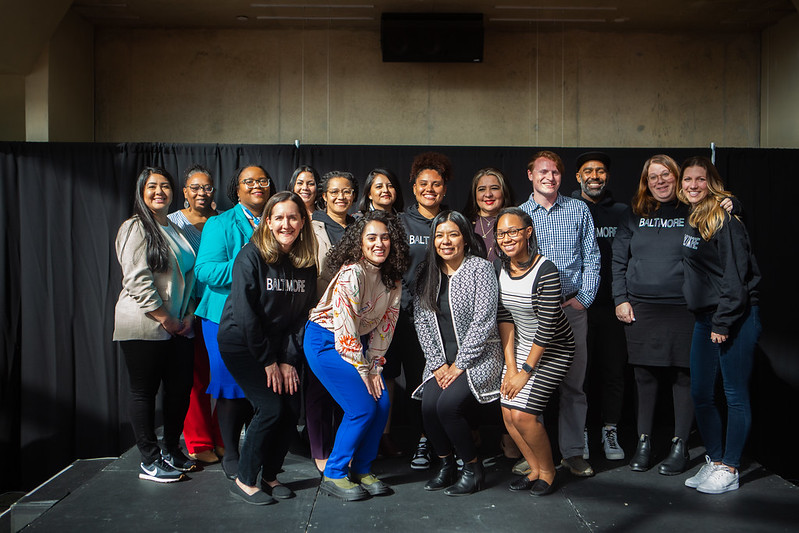Over the past 20 months, teams from three locations across the country – Cherry Hill in Baltimore, MD, Richmond, VA, and Yakima, WA – have worked closely together and with their schools and communities to develop equity-centered plans for building partnerships between families and schools. And on February 28 and March 1, these teams gathered in Washington, DC to present their fellowship strategic plans and to share their experiences with supporters and special guests. The convening shined a spotlight on Flamboyan’s approach to REAL Family Engagement which enables families access to family engagement resources that lead to increased student achievement outcomes.
The National Family Engagement Fellowship brings together unique and diverse groups from around the country to collaborate and design a family engagement strategic plan to implement in their local school communities that builds deeper and stronger relationships between families and schools using REAL Family Engagement.
The event was held at Arena Stage, a light-filled performance space in southwest DC, where Fellows mingled and networked with one another, Flamboyan colleagues, and the special guests each team invited to hear their strategic plans and next steps for the future. Joining the folks in attendance were more than 360 virtual attendees tuning in from a livestream on Flamboyan’s social media platforms. The event kicked off with Flamboyan Foundation’s CEO and Board Chair, Kristin Ehrgood, setting the tone for the day. Kristin emphasized that the REAL in REAL Family Engagement is not just a fun acronym or adjective but a daily reminder to put children at the center of this work and ensure families are heard with a true and authentic seat at the table.

The cohort teams spotlighted common themes across the families they serve. A clear call to action was the need to better support families by dismantling power structures that leave many Black and Brown families feeling unheard. Also, building school environments that foster two-way communication between families and schools, mutual respect, trust and safety were at the top of the priority list amongst families in the cohort school communities.
Equitable Access + Equal Partners
Dr. Erin Brown, Director of Family and Community Engagement at Richmond Public Schools (RPS) took the stage to introduce her team’s strategic plan, which focuses on ensuring RPS families and students are centered in policy and learning priorities. Like all of the cohort teams, listening sessions provided a launchpad for the RPS team. RPS sat with 100 diverse families from their school community, most of whom felt unseen or unheard. Those tough but necessary conversations uncovered a pattern of inequitable access to power and resources for Black and Brown families. Families were unequipped to advocate for their children and make meaningful connections with school leaders.
With that knowledge, the Richmond team spent the length of the fellowship mining solutions tailored to the RPS community which included adopting a regional community hub model: a data-driven, regional approach that leverages full-time family engagement liaisons in the community to meet families where they are, removing engagement barriers. RPS then developed division-wide engagement goals that strives to reduce chronic absenteeism, increase communication between families and schools and increase parent advocacy. Dr. Brown made a poignant statement during her presentation, “How are you advocating for the people, if you are not connected to the people?” A challenge that the Richmond team is working steadfastly to solve.
Our Community, Our History, Our Stories
The Cherry Hill school community, in Baltimore, MD, takes pride in being a place where authentic, trusting relationships between schools, families, and the community are central – but families and schools have not always had strong partnerships. Before conducting their landscape assessment interviews, the Cherry Hill team had to name the historic mistrust between the school system and families. However, the team didn’t let that barrier stop them from listening and learning from every family that would participate in an interview. Families amplified three key needs in their school community: Strong and consistent two-way communication between families and schools; respect and care that creates space for families to advocate; and trust and safety so that every family feels safe and welcomed at school.
With that clear mandate, the Cherry Hill cohort team started working to design a strategic plan that first, acknowledges and owns the history of their once intentionally segregated community. Based on feedback from families, the team has developed a clear vision for transitions between early learning and elementary school to support families in what can be a confusing process. They’re engaging in clear, consistent, and transparent communication across their school communities and creating vehicles for family involvement that address barriers to engagement, including building the capacity of their School, Family, and Community Councils. The Cherry Hill made it clear that their goal is to elevate the work and service as a model across Baltimore City.
Listening to Lead: Unleashing the Power of Migrant Families
The Yakima, WA team seeks to support and build equitable connections between migrant families and their school communities by equipping staff, families, and students with tools that value and honor all cultures, cultivating stronger relationships and a sense of belonging. Yakima families elevated three main concerns: The presence of a digital divide within the community where many families do not have consistent access to technology, ineffective communication between Yakima Valley families and their schools, and inequalities experienced by the Hispanic community of Yakima Valley.
The cohort team, a partnership of individuals from different locations within the Yakima Valley, collaborated to identify barriers to family engagement drawn from the team’s landscape assessment. Here’s what they learned: language barriers, limited access to childcare, non-flexible work schedules and the xenophobic political climate are a melting pot of issues that lead to fewer families engaging with Yakima schools. Throughout the Fellowship, the team worked to develop strategies that they believe will overcome these barriers of engagement and address the challenges unique to the Yakima community. The team has created networking opportunities that allow school team members to listen and learn from the experiences and voices of the Migrant Parent Advisory Council (PAC). In turn, they’ve encouraged members of the PAC to use their voices and elevate their needs, including identifying professional development and leadership opportunities.

“…if we really want real systemic change it takes people like us and the people in our communities…”
–Grady Hart, Coordinator of Community Partnerships, Richmond Public Schools
After learning about each strategic plan, representatives from each of the cohort teams took the stage together to share their reflections from the fellowship and insights into how other school communities can build stronger relationships with families. The teams also had an opportunity to make concrete requests for support and partnership from the special guests in the room.
To cap off a day of strategy, action, and hope for the future, cohort leaders expressed their gratitude for the opportunity to work alongside other education professionals that bring different perspectives and expertise to the table. The teams left the fellowship and the convening event with a renewed focus on shifting educator mindsets and continuing the work of REAL Family Engagement.
